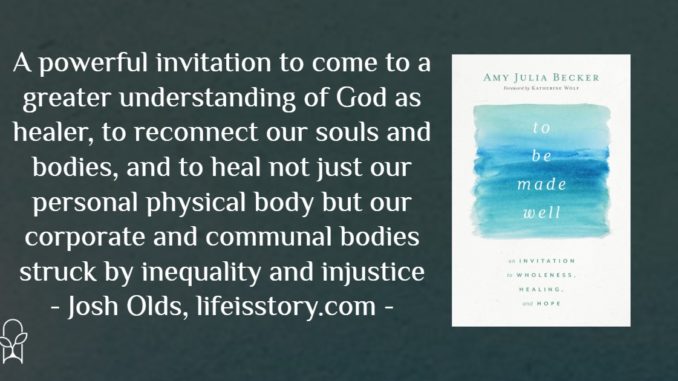
Published by Herald Press on March 15, 2022
Genres: Non-Fiction, Christian Life
Buy on Amazon
Goodreads

How can we be made well?
From hurting bodies and souls to hurting relationships and communities, it’s clear that things are not as they should be. Some of us live with varying degrees of physical pain, and others of us harbor the emotional pain of loneliness, shame, and guilt. Looking at our culture more broadly, we see the harm of our social divisions and the unyielding reality and impact of injustice and inequity. The gospels brim with stories of Jesus healing people, but what does that mean for us today?
In To Be Made Well, author Amy Julia Becker weaves together her own story with reflections on biblical accounts of Jesus’ healing work, providing fresh insight into both the nature of healing and the pathway to healing, then and now. This book is a powerful invitation to personal, spiritual, and social healing as we reconnect to our bodies and souls, to God, and to our communities. For anyone struggling with pain or loss, for anyone concerned about the things that divide us, this book goes beyond wellness and beyond miraculous physical transformations to explore how we can—personally and collectively—be made well.
Becker divides To Be Made Well into three categories: that nature of healing, barriers to healing, and participation in healing. The first part sets the foundation for the type of healing the book is going to focus on. When you think of healing or wellness, your natural inclination might be physical healing or wellness. Healing is a major part of Jesus’s ministry, but, as Becker points out, Jesus’s healings went beyond the physical into the societal and spiritual.
To Be Made Well begins by recounting Amy Julia Becker’s personal healing journey and her struggles with chronic and unexplained pain. While I’m generally suspicious of mind-over-matter types of healing, Becker lays out a decently firm foundation for how mental health factors affect our physical health. She is absolutely correct that the Western world has divided the mind/soul and the body and that such division has caused some of our physical medical interventions to be insufficient. She is also correct that our spiritual and mental states have an indelible effect on our physical state. The only thing that I would add is that there is a difference between not feeling pain and being healed. Pain is a symptom of a problem. Not feeling the pain doesn’t necessarily take away the problem, just the alert that a problem exists. I would have liked to have seen a discussion about the positive role of pain and how listening to our pain can lead to healing.
The second part of To Be Made Well focuses on the barriers of distraction, shame, anxiety, and status. The barrier of shame is one I found especially poignant, as our society tends to accuse the individual who is unwell of being the reason for their unwellness. A stronger person wouldn’t have gotten sick. A better person would have avoided injury. Using her own story, Becker shows readers how the shame associated with sickness can be a barrier to seeking healing. Since this book is written in the continuance of the COVID-19 pandemic, Becker is able to engage with the current cultural moment to speak on how each of these barriers led some to downplay the virus and not see it as the kind of threat that, now over two years in, has killed millions.
The last part of To Be Made Well is probably the most important, as Becker discussion our participation in the healing process. She talks about physical healing, but also about communal, social, and spiritual healing. That is, healing is more than just the body. Healing means the creation of just systems. Healing means supportive and inclusive communities. Healing means giving individuals the context in which to heal. Jesus’s healings were physical, but they had the larger goal of spiritual and social healing. These healings were about restoring individuals to their communities. The woman with constant menstrual bleeding can now be ritually pure and be around family members and attend worship. Those with leprosy can rejoin their communities and no longer be outcast. Physical healing is great—but Jesus always places it in the larger society of healing relationships and healing souls.
To Be Made Well is reflective, personal story of finding insight into the nature of healing. It will expand your idea of what healing is and what it means to be healed. It’s a powerful invitation to come to a greater understanding of God as healer, to reconnect our souls and bodies, and to heal not just our personal physical body but our corporate and communal bodies struck by inequality and injustice. It’s a beautiful, holistic, powerfully-written, and compelling book.
